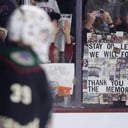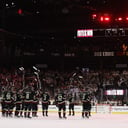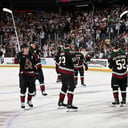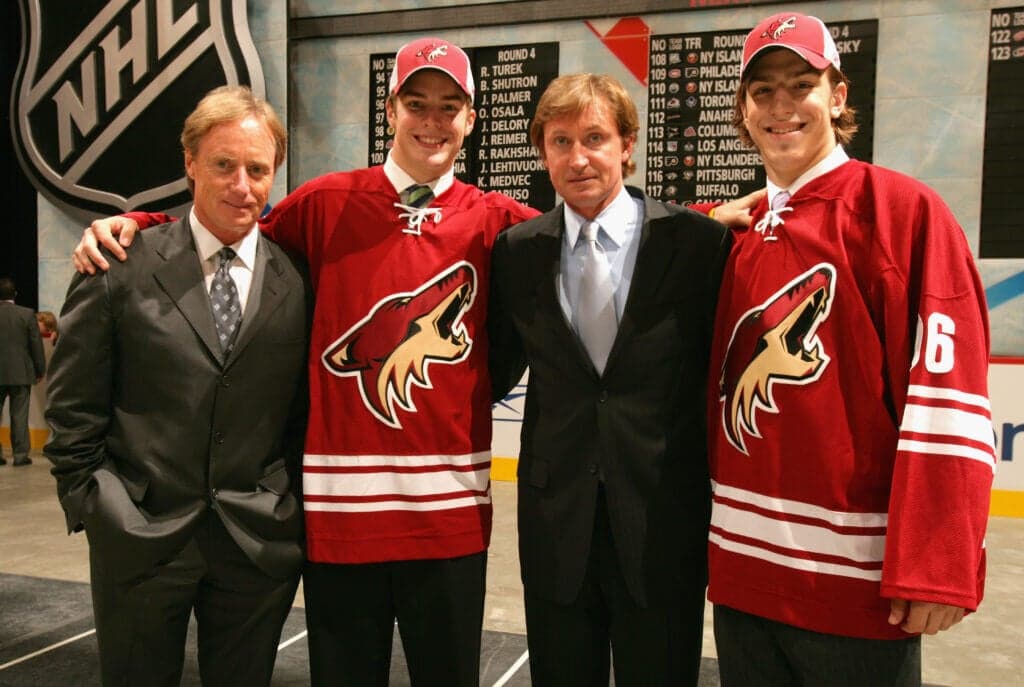Dave King spent seven years working for the Phoenix Coyotes – first on the coaching staff, then as a consultant – and he liked the area so much that he settled there in retirement. As did a lot of ex-NHL coaches, managers, and players. The hockey community is thriving in Arizona, even if the NHL is on the way out.
Advertisement
According to King, the greater Phoenix area will be an ideal market if they can ever get the arena issue properly sorted out.
“It isn’t like we don’t have hockey fans in Phoenix,” King said. “We do. We have lots. It’s always been about the facility… I still think Phoenix is a good place – a really good place – for an NHL team. The one key is, put the new facility in a place where it’s accessible to more people. If you do that, you’ll get more people to come out and watch.”
Following a board of governors’ meeting Thursday, the NHL officially announced the establishment of a new franchise in Utah, owned by the Smith Entertainment Group, that will begin play in the 2024-25 season. At the same time, the league approved a plan to declare the Arizona franchise inactive. Arizona owner Alex Meruelo can reactivate the team if he can construct a new state-of-the-art facility appropriate for an NHL team within five years.

GO DEEPER
Arizona Coyotes relocating to Utah: NHL board of governors approves sale to Jazz owner
If Meruelo cannot do it on his own, then the league would be in a position to look elsewhere to reactivate the franchise. The overall sense is that Meruelo could face an uphill climb to meet the NHL’s deadline, though officially, he has a five-year window to get a proper building in place.
Tim Bernhardt, a former Coyotes chief scout, still lives in Phoenix during the winter and attended the final game at the Mullett Arena Wednesday night. He believes the biggest error in recent years was leaving Glendale, because of a messy divorce between the city and Muerelo.
“They should have still been in Glendale, working toward something else,” Bernhardt said. “For the final game, you could see the passion for the market. Probably the most passionate 5,000 fans came out. And here’s the other thing: Everybody who ever played here loved it. If they ever had a real good franchise, you would have zero problem getting free agents to come.”
Advertisement
The NHL does have a history of returning to a market that didn’t work out the first time, most notably with Minnesota. The North Stars, a 1967 expansion team, moved to Dallas in 1993. Seven years later, as part of an ambitious expansion plan that added four teams in three years, Minneapolis-St. Paul got the Wild. There is also talk that Atlanta, which failed twice before, is in line for a team whenever the NHL gets around to expansion again.

GO DEEPER
Coyotes owner details plan to bring NHL team back to Arizona
Bernhardt believes the greater Phoenix area bears a strong resemblance to one of the NHL’s greatest recent success stories, the expansion Vegas Golden Knights, who joined the league in 2017 and became an overnight sensation.
“This market, and I’ve been here a long time, it’s very similar to Vegas,” Bernhardt said. “It’s the desert. It’s the southwest. The difference is, this city is way bigger than Vegas, almost 6 million people, and they have an actual good hockey base here already. They’ve got the junior programs. They’ve got the university here now.
“There’s no way, with the proper ownership, that this place wouldn’t thrive. I honestly believe that. It’s just never had the proper ownership or the proper location, and partly as a result of that, they haven’t had many good teams. Except for markets like Toronto, what market supports a team that’s made the playoffs nine times in 27 years?”
Michael Barnett, general manager of the Coyotes between 2001 and 2007, seconded Bernhardt’s point. He believes the legacy of the Coyotes will live on because of the strong grassroots programs that developed over almost three decades in Arizona.
“They followed the Dallas blueprint there, by building community rinks in different areas,” Barnett said. “Growing up, all these young kids had NHL players to emulate.”
According to Barnett, it’s more than just the handful of players who’ve graduated to the NHL, the likes of Auston Matthews, Matthew Knies, and Josh Doan.
Advertisement
“You look at the ASU program,” Barnett said. “They’ve beaten the best schools in the nation and it’ll only get better as more and more kids and parents discover that ASU can be a heck of a place to get an education and play Division 1 hockey.
“There are enough former NHL players in the area that aren’t leaving. There are so many former NHLers on the bench, at every level of hockey, in the greater Phoenix area and they’re not going to let it go. .. I don’t think there are many other cities in the U.S. that have, on a per capita basis, more former NHLers on the ice with youth players.
“I sat at a game sometime this year with Doaner (Shane Doan) and in his suite, there was Shane, Scotty Niedermayer, Ray Whitney, Daymond Langkow – and they all had boys in various programs in minor or college hockey. That can be the backbone of why I think the youth hockey programs will continue to flourish.”
Boris Dorozhenko, who coached Matthews when he was first getting into hockey, said that more than any other emotion, he felt sadness on Wednesday for the final game.
But Dorozhenko said the Coyotes’ departure could also be seen as “an opportunity to build things the right way.”
“The years the Coyotes spent in the Valley were very productive in terms of creation of the players. The impact, the connection – of the pro team to youth hockey – was very important and (contributed to) the success of Auston Matthews, the success of Mathew Knies, later success of Josh Doan,” Dorozhenko said. “I was a big witness to that creation. We need to say thank you to the Coyotes’ presence in the Valley because their presence created the love for hockey in players like Auston Matthews.”
Bernhardt wasn’t convinced that the Coyotes’ final plan – to win a land auction in June and construct a new arena on the northern edge of the community – would have been ideal either. He believes that’s still too far away from where the team would draw the most fans.
Advertisement
Instead, he thinks the better solutions would have been either to get together with the NBA’s Phoenix Suns on a downtown arena; or if they’d been able to secure permission to build in Tempe, an initiative that was turned down by voters in May of 2023.
“A downtown arena would be ideal,” Bernhardt said. “But the other ideal situation was Tempe. Tempe was the best location they had. Tempe was perfect. They just got overconfident and thought the vote was a slam dunk. It’s very central. It would have been really, really good.”

GO DEEPER
Everything we know about the Coyotes' move to Utah: What went wrong? Will team name change?
The Coyotes originally landed in Phoenix at the start of the 1995-96 season, moving there from Winnipeg. Former NHLer Paul Bissonette, now a panelist on the TNT NHL broadcasts, gave a passionate endorsement of the market – and the people who worked for the Coyotes – as Wednesday night’s broadcast wound down. Bissonette credits the Coyotes for giving him a chance to play in the NHL and ultimately develop a career in hockey after the game. He won’t be the only player disappointed in this outcome.
Hard to sum it up in one segment but @BizNasty2point0 talks about what being an Arizona Coyote meant to him 🥹 pic.twitter.com/ptkbysiDsR
— NHLonTNT (@NHL_On_TNT) April 18, 2024
“A lot of our alumni will be sad to see the team leave,” King said. “Our players who’ve stayed here and got involved in youth hockey – the Ray Whitneys and the Brian Savages – are really good people. Shane Doan, when he was here, was really involved.”
But King also saw a silver lining in the move.
“If you’re looking at the big picture, this is not a bad outcome for the league. If we have a chance to get a franchise here five or six years down the road, there’ll be a good appetite for it. And I think they’ll do it right. Maybe in the long run, that’s the solution. Because the current situation felt like it could just go on and on. In essence, this is probably a good Band-Aid, in the big picture.”
You can buy tickets to every NHL game here.
(Top photo of Coyotes GM Michael Barnett, left, with Wayne Gretzky at the 2006 NHL Draft: Jeff Vinnick / Getty Images)

